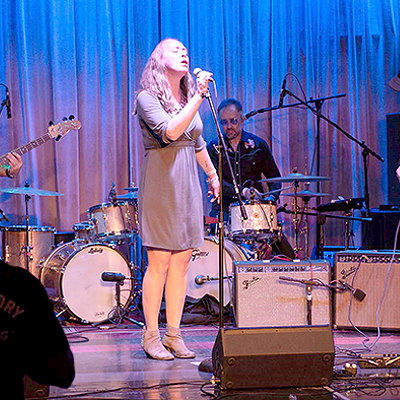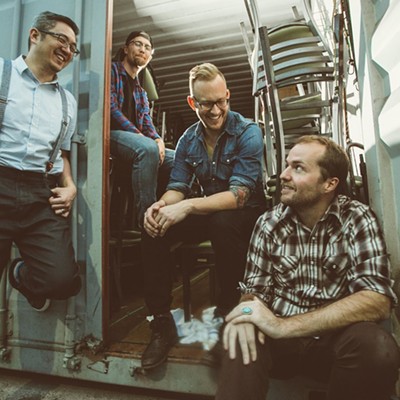The embodiment of the cliché a "musician's musician," Thompson is an artist of great and consistent critical acclaim, and though his fans, who span the big water and three decades, show near cultish devotion, the name Richard Thompson will likely draw blank stares at the company water cooler.
Despite a 1991 Grammy nomination for, of all things, Best Alternative Music Album (Rumor and Sigh)--defeated, along with Nirvana, Elvis Costello and Jesus Jones, by REM's Out of Time--and another in 1996 for You? Me? Us?, Thompson has never enjoyed the mass recognition many pundits believe he deserves. According to the man himself, he is not a star rightly so, and claims he has never written with that purpose.
Like the triad of song cycles on his most recent full-band release, 1999's Mock Tudor, Thompson's career cleaves easily into three basic chapters: Fairport Convention, Richard and Linda Thompson, and Richard Thompson solo.
Thompson's recording career began with the seminal folk-rock ensemble Fairport Convention's self-titled 1968 Polydor release. Thompson was a member of Fairport for three subsequent albums, including Liege & Leif and Full House, during which time he honed his songwriting and guitar skills. It has been said that Thompson may not have invented folk-rock, but he perfected it.
His departure from Fairport in 1971 resulted in his 1972 solo debut, Henry the Human Fly, which was followed by a decade of recordings with fellow ex-Fairport singer and then-wife Linda, beginning with 1973's I Want To See the Bright Lights Tonight. The Thompsons recorded a series of acclaimed albums until their personal and professional split in 1982, serialized in Shoot Out the Lights, eight heart-rending songs widely thought to be the couple's best work.
Thompson's pairing with his second wife, American Nancy Covey, in the mid '80s brought about two major changes in his career: Thompson became a solo artist and band leader, and established semi-permanent residency in Southern California.
Critics call this the beginning of the Americanization of Richard Thompson. Effectively, what this translated into was a base of operation in the States, an opportunity to finally leave Fairport in the past, in England, and a chance to introduce himself to a wider audience in America.
After several recordings for Hannibal Records, including the heralded Hand of Kindness, Thompson signed with American major label Capitol Records in 1987. His best-selling record to date, 1991's Rumor & Sigh, includes his most requested song, "1952 Vincent Black Lightning" (lovingly covered by Tucson folkie Stefan George).
In 1994, Capitol released Beat the Retreat, a tribute compilation of Thompson's songs covered by REM, John Doe, Bob Mould, Syd Straw and Evan Dando, Bonnie Raitt, Los Lobos, Dinosaur Jr., Graham Parker, June Tabor, David Byrne and Loudon Wainwright III, and others. In the '90s, the tribute record became the de rigeur honor for "legends," and such homage also proved a nice gamble for the songwriter and label, who might score with royalties if one of the covers hit it big. The assemblage of folks covering Thompson on Beat gives an idea of the range of his influence.
After a decade of Capitol releases, beginning with 1988's Amnesia and concluding with last year's Mock Tudor, Thompson comes to Tucson as a free agent and solo performer. The decision not to renew contracts with Capitol was mutually amicable; Thompson and Capitol staff are in the process of collaborating on selections for a best-of compilation, due out sometime next year. One can fairly assume that in addition to certain obvious choices, the Capitol tracks will be interspersed with live material, which Thompson releases in abundance.
In lieu of a lost opportunity to speak with Thompson, I spoke with his manager, Donnie Graves. Thompson's manager of the past two and a half years, Graves is polite and well spoken, and full of interesting information about the man and his present career.
The music industry is a fickle business, especially for an artist who is primarily known as a singer-songwriter and guitar player, and not as the rocker du jour or latest Latin pin-up. The music has to stand up for itself, and in the current marketplace quality is a surprisingly hard sell, which goes a long way toward explaining Thompson's stature as a musician's musician.
According to Graves, Thompson is in the enviable position of following his muse, and his judgement is guided by the wisdom to know the difference between a good offer and a truly interesting one. Thompson has composed a career of whatever it pleases him to do, and these days that means turning down 10 "big" offers a week in favor of the one curiosity worth considering.
And therein lies the key to Thompson's eclecticism--because Thompson's interests both musical and other vary so widely, most of the projects on which he turns up are fairly avant-garde. According to Graves, Thompson's current favorite group is the Comedian Harmonists, an obscure and apparently risqué German a cappella group from the 1930s, popular until the political climate drove them into diaspora. Given that, it's understandable that most of what crosses Thompson's path is simply not odd or out enough to pique his interest.
What appears to be next for Thompson is a deal with a smaller, more aggressive label--a move that Thompson and his manager hope will enhance his standing as a contemporary artist, and continue to nurture his career. In a way, it is similar to Steve Earle, who has been able to mature in his music and strengthen his credibility over time. The deals are all on the table; it's merely a matter of choosing, and the choice will no doubt be made for other than obvious reasons.
Thompson is currently compiling new material for his next record, and odds are in our favor that he will try out some of his new songs during his show in Tucson. According to his Graves, it is Thompson's practice to test new songs before a live audience; what works and what doesn't is plainly apparent from the stage. The Berger Center show is a quieter solo conclusion to an extensive album tour for Mock Tudor, in which Thompson traveled much of the past 18 months with a full band.
Richard Thompson performs in concert at 8 p.m. Friday, November 17, at the Berger Performing Arts Center, 1200 W. Speedway Blvd. Advance tickets, if still available, cost $20 and may be ordered by calling 327-4809.










